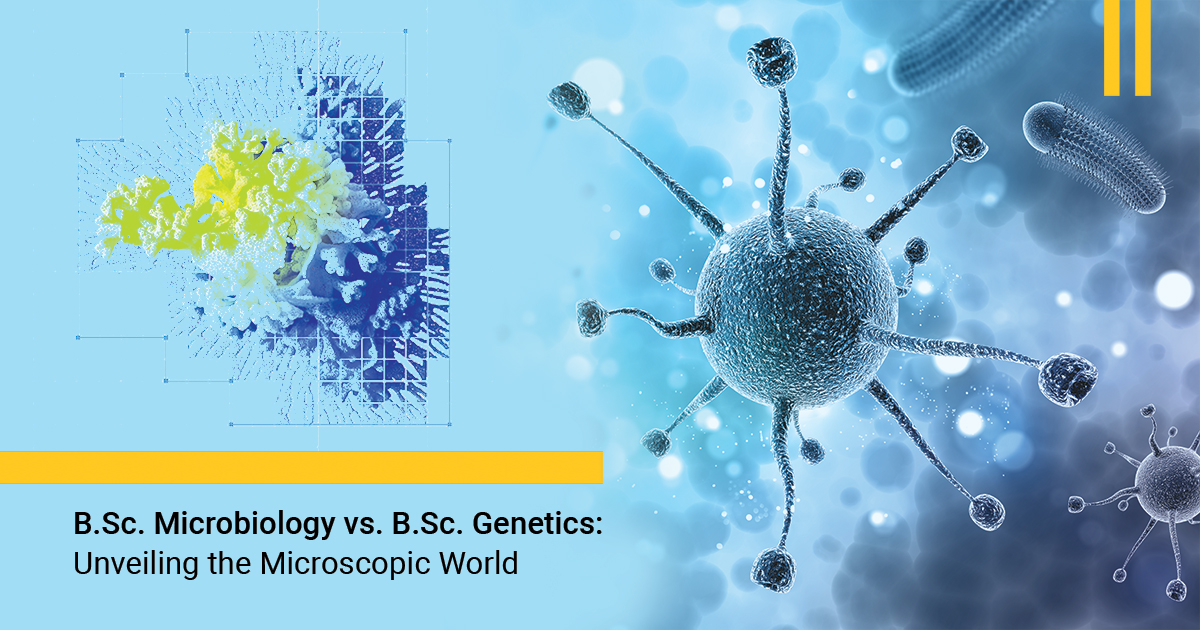Blog Detail


B.Sc. Microbiology vs. B.Sc. Genetics: Unveiling the Microscopic World
04-10-2024

Explore the microcosmic world and probe through the lenses to understand the little matters that everyone and everything is made. The study of microbiology and genetics is to find advanced agricultural and animal husbandry practices, discover the elixir for youth and design cures for all types of illnesses. B.Sc. Microbiology and B.Sc. are two very interesting specialisations with exciting opportunities. There are many career options to choose from after B. Sc. with Education Institutions, Research organisations, Manufacturing companies, Government agencies, Pharmaceutical and medical fields, oil and gas, and mining industries among others. Let us take a look at these courses.
Course Duration and Eligibility: B.Sc. Microbiology vs. B.Sc. Genetics
The Bachelor of Science programme is a popular choice among students after they complete their 10+2. It is a 3-year course, and some colleges also offer a 4-year Honours programme. To be eligible for a B.Sc. in Microbiology and B.Sc. Genetics you have to complete the 12th grade with Physics, Chemistry, Biology, and Mathematics as main subjects. Some colleges have an entrance exam such as the CET and you can qualify for the programme with a minimum of 50% in the 12th Board exams and CET scores.
Syllabus and Curriculum: B.Sc. Microbiology vs. B.Sc. Genetics
- Sc. Microbiology covers the study of microscopic bacteria, fungi, unicellular organisms, and viruses. It is the study of the effect of microscopic organisms on the environment and the human body. The syllabus for the course include Biology, Physics, Chemistry, Microbial Ecology, Biochemistry, Microbiology, Information systems, Mathematics, Molecular biology, Cell Biology, Mycology, Inheritance biology, Microbial physiology, Immunology, Analytical biochemistry, Enzyme technology, Virology, Biostatistics, General microbiology lab, Food Microbiology, Molecular biology, Industrial Microbiology, Medical bacteriology, Pharmacology, Recombinant DNA technology, Parasitology, Environmental and agricultural microbiology and Research Methodology.
The course includes extensive lab work and projects and in the honours programme, they have to submit a dissertation.
B.Sc. Genetics studies heredity, Biological variations, and mechanisms of living bodies. Students will learn about the cellular and molecular aspects of genetics, diseases, and chromosome theory. They will learn about the underlying scientific factors related to evolution and population. The course content is designed to educate students about the history of genetics, the transfusion process, research, and analysis. The syllabus for the course include History of Genetics, Model Organisms, Multiple AllelesScope of Genetics, Elements of Biometry, Ultrastructure of cells and cell organelles, Law of Segregation Cell, Biology, Gene Interactions, Law of Independent, Assortment, SexDetermination, Biography of Mendel, Study of types of Drosophila, Nucleic Acids, Cytogenetics, DNA Replication, Culturing and Handling of Drosophila, Chemical Basis of Heredity and so on.
Students will also have to take some non-core electives such as entrepreneurship or communication skills. The course has extensive lab work and a research thesis.
Further Education:: B.Sc. Microbiology vs. B.Sc. Genetics
After B.Sc. Microbiology, to develop your skills further, cultivate a specialisation, or research you can pursue -
- Sc. in Microbiology
- Sc. Genetics and bioinformatics
- Sc. Applied Microbiology
- Sc. Medical Microbiology
- PhD
After B.Sc. Genetics, you can study -
- Sc. Genetics
- Sc. Molecular & Cellular Biology
- Sc. Genetic and Genomic Counselling
- Sc. Parasitology
- Sc. Bioinformatics and Computational Genomics
- D.
Career scope: B.Sc. Microbiology vs. B.Sc. Genetics
The career opportunities after B.Sc. Microbiology includes -
- Doctorate to qualify for a Professorship or chief researcher position
- MBA and enter the management and entrepreneurship fields
- Microbiologist
- Laboratory technician to perform analytical or experimental procedures and maintain laboratory equipment
- Food technologist
- Clinical research to study drugs
- Biomedicine
- Science writer
- Bacteriologist, Virologist, Mycologist, Cell Biologist, Immunologist
- Marine Biologist
Job opportunities for Microbiologists are in fields of Medical research, Biotechnology companies, Food safety and quality control, Research institutes, Schools, colleges, Universities, Food industry, Chemical industry, Pharmaceutical companies, Government agencies and Bioscience institutes.
Career opportunities after B.Sc. Genetics are as -
- Bio-technician
- Genetics Laboratory Technician
- Genetics Counsellor
- Forensic Scientist
- Cytogenetics Technologist
- Clinical Geneticist
- Genetics or Gene Technology Researcher
- Professor
These roles for Geneticists are in the Farming sector, Animal husbandry, Horticulture, Agricultural industry, Forensics department, Beauty industry, Genetics testing labs, Hospitals, Genetic research companies, Pharmaceutical companies and Educational institutes.
Microbiology and Genetics are vast subjects with wide application across various industries and fields. With the right specialisations, one can work in a variety of fields in the public and private sectors and even consider entrepreneurial ventures.